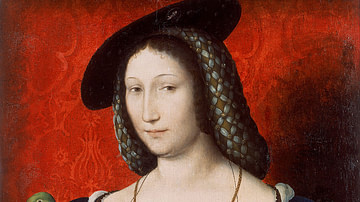Search
Search Results

Definition
Marguerite de Navarre
Marguerite de Navarre (l. 1492-1549) was a writer, philosopher, diplomat, and Queen of Navarre, sister of King Francois I (Francis I of France, r. 1515-1547), mother of Jeanne d’Albret (l. 1528-1572) and grandmother of Henry IV of France...

Definition
Leo Africanus
Leo Africanus (al-Hasan ibn Muhammad ibn Ahmad al-Wazzan al-Fasi al-Granati, 1485-1554) was a diplomat, merchant traveller and scholar who famously voyaged from Timbuktu to the Niger River and wrote 'The Description of Africa' (La Descrittione...

Definition
Giovanni Boccaccio
Giovanni Boccaccio (1313-1375) was an Italian poet, writer, and scholar. His most famous and influential work is the Decameron, completed by 1353, in which his ten characters present 100 tales of everyday life. The book covers all manner...

Definition
Château d'Amboise
The Château d'Amboise, located in the Loire Valley, in central France, was built over several centuries and was the centre of royal power during the Renaissance (from the 15th to the early 17th century). Witness to the heyday of the French...

Definition
Vitruvius
Marcus Vitruvius Pollio (c. 90 - c. 20 BCE), better known simply as Vitruvius, was a Roman military engineer and architect who wrote De Architectura (On Architecture), a treatise which combines the history of ancient architecture and engineering...

Definition
Christopher Marlowe - Poet, Playwright, Spy
Christopher Marlowe (1564-1593), or Kit Marlowe, was a poet and playwright of the English Renaissance who wrote during the Elizabethan Era (1558-1603). His mastery of the blank verse – unrhymed iambic pentameter – transformed the way plays...

Definition
Sofonisba Anguissola - The Founder of Feminist Art
Sofonisba Anguissola (c. 1532-1625) was an Italian Renaissance painter from Cremona who achieved considerable fame during her lifetime as the first widely-known female artist. She was invited by the Habsburg King Philip II of Spain (reign...

Definition
Ben Jonson - The Second Greatest Playwright of Jacobean Theatre
Ben Jonson (1572-1637) was an English poet, playwright, and literary critic, whose influence on English Renaissance literature during the Jacobean Era (1603-1625) has been regarded as second only to that of William Shakespeare (1564-1616...

Image
Mona Lisa
The Mona Lisa (also known as "La Gioconda" in Italian) was painted by Italian Renaissance painter Leonardo da Vinci (1452-1519) c. 1506. The oil on wood panel portrait is one of da Vinci's most well known works, as well as one of the most...

Definition
John Fletcher - Father of the English Tragicomedy
John Fletcher (1579-1625) was a playwright of the English Renaissance who flourished during the Jacobean Era (1603-1625). The author of over 50 plays, he is known for developing the genre of tragicomedy in English literature, and for his...